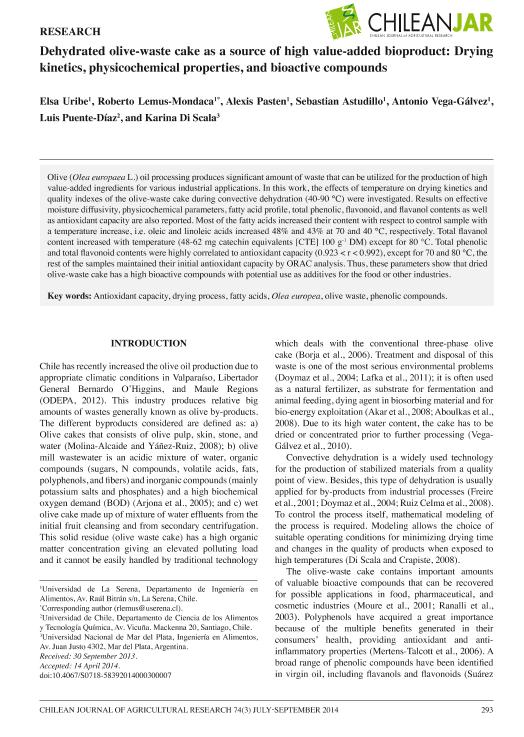Mostrar el registro sencillo del ítem
dc.contributor.author
Uribe, Elsa
dc.contributor.author
Lemus Mondaca, Roberto
dc.contributor.author
Pasten, Alex
dc.contributor.author
Astudillo, Sebastian
dc.contributor.author
Vega Gálvez, Antonio
dc.contributor.author
Puente Díaz, Luis
dc.contributor.author
Di Scala, Karina Cecilia

dc.date.available
2018-01-25T17:43:39Z
dc.date.issued
2014-06
dc.identifier.citation
Uribe, Elsa; Lemus Mondaca, Roberto; Pasten, Alex; Astudillo, Sebastian; Vega Gálvez, Antonio; et al.; Dehydrated olive-waste cake as a source of high value-added bioproduct: Drying kinetics, physicochemical properties, and bioactive compounds; Instituto de Investigaciones Agropecuarias; Chilean Journal Of Agricultural Research; 74; 3; 6-2014; 293-301
dc.identifier.issn
0718-5820
dc.identifier.uri
http://hdl.handle.net/11336/34604
dc.description.abstract
Olive (Olea europaea L.) oil processing produces significant amount of waste that can be utilized for the production of high value-added ingredients for various industrial applications. In this work, the effects of temperature on drying kinetics and quality indexes of the olive-waste cake during convective dehydration (40-90 °C) were investigated. Results on effective moisture diffusivity, physicochemical parameters, fatty acid profile, total phenolic, flavonoid, and flavanol contents as well as antioxidant capacity are also reported. Most of the fatty acids increased their content with respect to control sample with a temperature increase, i.e. oleic and linoleic acids increased 48% and 43% at 70 and 40 °C, respectively. Total flavanol content increased with temperature (48-62 mg catechin equivalents [CTE] 100 g-1 DM) except for 80 °C. Total phenolic and total flavonoid contents were highly correlated to antioxidant capacity (0.923 < r < 0.992), except for 70 and 80 °C, the rest of the samples maintained their initial antioxidant capacity by ORAC analysis. Thus, these parameters show that dried olive-waste cake has a high bioactive compounds with potential use as additives for the food or other industries
dc.format
application/pdf
dc.language.iso
eng
dc.publisher
Instituto de Investigaciones Agropecuarias

dc.rights
info:eu-repo/semantics/openAccess
dc.rights.uri
https://creativecommons.org/licenses/by-nc-sa/2.5/ar/
dc.subject
Antioxidant Capacity
dc.subject
Drying Process
dc.subject
Fatty Acids
dc.subject
Olea Europea
dc.subject
Olive Waste
dc.subject
Phenolic Compounds
dc.subject.classification
Alimentos y Bebidas

dc.subject.classification
Otras Ingenierías y Tecnologías

dc.subject.classification
INGENIERÍAS Y TECNOLOGÍAS

dc.title
Dehydrated olive-waste cake as a source of high value-added bioproduct: Drying kinetics, physicochemical properties, and bioactive compounds
dc.type
info:eu-repo/semantics/article
dc.type
info:ar-repo/semantics/artículo
dc.type
info:eu-repo/semantics/publishedVersion
dc.date.updated
2018-01-24T14:51:36Z
dc.journal.volume
74
dc.journal.number
3
dc.journal.pagination
293-301
dc.journal.pais
Chile

dc.journal.ciudad
Chillán
dc.description.fil
Fil: Uribe, Elsa. Universidad de la Serena; Chile
dc.description.fil
Fil: Lemus Mondaca, Roberto. Universidad de la Serena; Chile
dc.description.fil
Fil: Pasten, Alex. Universidad de la Serena; Chile
dc.description.fil
Fil: Astudillo, Sebastian. Universidad de la Serena; Chile
dc.description.fil
Fil: Vega Gálvez, Antonio. Universidad de la Serena; Chile
dc.description.fil
Fil: Puente Díaz, Luis. Universidad de Chile; Chile
dc.description.fil
Fil: Di Scala, Karina Cecilia. Consejo Nacional de Investigaciones Científicas y Técnicas; Argentina. Universidad Nacional de Mar del Plata. Facultad de Ingeniería. Departamento de Ingeniería Química. Grupo de Inv En Ingeniería En Alimentos; Argentina
dc.journal.title
Chilean Journal Of Agricultural Research

dc.relation.alternativeid
info:eu-repo/semantics/altIdentifier/doi/http://dx.doi.org/10.4067/S0718-58392014000300007
Archivos asociados
